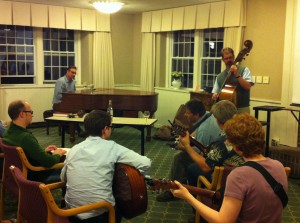Ecclesiology and Ethnography
(church and research)
Sitting outside this evening feeling the warm wind and watching the rolling clouds, I’m thinking back over the last couple of days. The Ecclesiology and Ethnography Conference unfolded Monday and Tuesday in St. Paul, Minnesota. A small group of scholars from England, the United States and Sweden gathered to present ideas and talk together about theologies of the church (ecclesiology) and one particular set of ways we can approach understanding it better (ethnography).
The meeting was hosted by Chris Scharen at Luther Seminary. He and other practical theologians have been engaging in an intentional conversation for several years about how to make greater sense of what is going on in churches and how to get at such an understanding more carefully. This conversation is part of a larger change in practical theology in particular, and other areas of academic theology as well. The new direction is to engage intentionally in researching the church in its lived expression, rather than only reading and writing about the doctrines and texts about the church. In the last couple of decades some theologians have been asking:
* What can we really know about theology without investigating what is happening ‘on the ground’?
* What can we know about the meaning and purpose of the church without considering actual embodied churches?
Studying Theology and Church
Some like myself, chose a course of training during doctoral studies to prepare us for “field work” in theology. We learned the skills and tools for seeing churches, leaders and other religious organizations in their messy particularity.
The conference participants who gathered read in advance a new book edited by Pete Ward, senior lecturer at King’s College in London, England. Perspectives on Ecclesiology and Ethnography, first in a series of books, attempts to formalize some conversations about how we can understand the church, and theologies of the church (ecclesiology) more fully through qualitative research that is close to the ground.
Ethnography is a research method, a way of writing, and a set of practices for understanding cultures and peoples. The most common methods include participant-observation, interviewing individuals and groups, taking notes and recording events and interviews, immersing oneself in the situation and reflecting carefully on all one notices.
Great care is needed for the work of ethnography including careful procedures for gaining consent of people participating in a study, ethical action throughout the research and presenting (or representing) what one learns. Such care also includes a self-honesty about the perspectives and motivations one brings into the study as a researcher.
Learning from One Another
For the conference we read one another’s papers in advance, and rather than present them in a traditional way, each presenter gave a brief introduction to her or his work, then asked three questions for the group. The conversations were rich and interesting.
Most of the participants have spent time using the tools of ethnography, or other qualitative methods, in an effort to understand some aspects of religious life. Topics of the papers included teaching in churches, studies of particular congregations and “emergent churches,” worship practices of homeless and marginalized persons, studies of monastic communities, and studies of multi-site and on-line/off-line churches.
A Conversation with Pastoral Theology
My contribution was to consider how the discipline of pastoral theology might both learn from and offer wisdom to this new conversation between ecclesiology and ethnography. I began by recounting some of my pastoral and academic formation which prepared me for my own work of studying ministers and the situation of ministry. A number of people told me they appreciated the invitation to think through their own “academic genealogy” (another post for another day). Then I sketched some arguments from my paper.
Pastoral theology begins its theological work in messy, lived experience, uses qualitative methods (case study and verbatim) in conversation with various social science perspectives (i.e. psychology), and thus already goes beyond “the customary divide between empirical and theological analyses.” (This divide is what Ward, Scharen and the EE series editors hope to overcome.)
Pastoral theology has faced critiques including a) being beholden to social sciences; b) ignoring theology and falling victim to a “therapeutic” culture; c) giving too much attention to the individual; d) focusing too much on the muck of human experience as a source for theological reflection; e) failing to engage rigorously with doctrine. Pastoral theology continues to answer these critiques, expand its notions of care, propose constructive theological projects, make challenges to a wide range of social injustices, and use ethnography and other qualitative research methods to understand human institutions (i.e. church), and their practices of care.
The history and methods of pastoral theology invite learning from those new to the intersection of theology and the social sciences. And pastoral theology can do its work better, in some instances, when it responsibly and carefully makes use of ethnographic tools for researching religious communities and cultures as well as individuals and families.
Churches Matter
If you made it this far, you might consider advanced studies in … well something?! For myself, I take the time to make this conversation available – if only in its widest contours – because I think that churches matter and the lives of people in them matter. Deeper understanding seems an unavoidable obligation in a world where community and sacred connection are needed now as much or more than ever.




